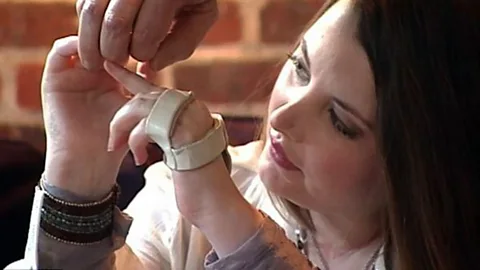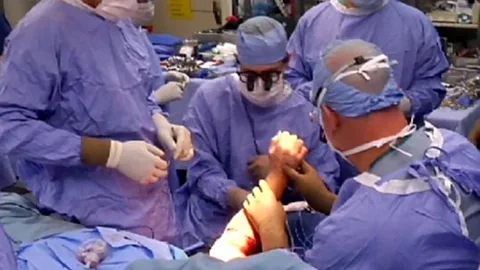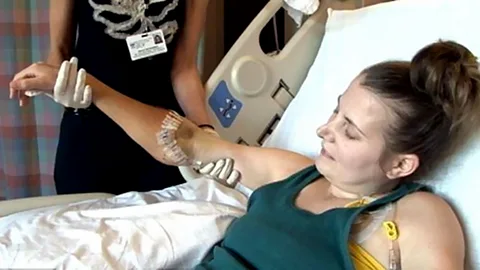‘I had a double hand transplant’


Imagine looking down at your hands and seeing fingers that aren’t your own. Rose Eveleth asks a woman with a double hand transplant what it feels like. It’s the first in a series where we talk to fascinating people who are living the future today.
The first thing Lindsay Ess remembers after waking up from nearly 12 hours of surgery was being afraid to look at her hands. “I called them the new hands,” she says, “because they were still foreign, something new. I remember looking down and seeing purple nail polish on the thumb,” she says, “and I was suddenly even more aware of the fact that these belong to somebody who just passed away.” Now, two-and-a-half years later, the hands are very much her own. But it hasn’t been easy.
Ess, who lost her hands to an infection, is the beneficiary of a futuristic surgical procedure. Only 70 people around the world have received a full new replacement hand. Ess is one of the few to have two. “This is the first time in the history of body parts that we’ve been able to restore body parts rather than reconstruct them,” says Dr Scott Levin, Ess’s surgeon and the director of the Penn Hand Transplant Program. So what’s it like to be a recipient?
Hand transplants are rare, and not everybody is a good candidate. Candidates have to go through a battery of tests to make sure that they’re healthy enough to not only go through with the procedure, but stay on immunosuppressant drugs for the rest of their lives to ensure their body doesn’t reject their new body parts. “I can't even explain all the tests they did to me,” Ess says, “it was days and days.” After a year of testing and preparing, Ess was cleared to go ahead with the transplant – and then she waited.
One day, in late September, a donor set of hands became available. Ess entered the operating room, and with the help of 12 surgeons emerged with a new pair of hands. The procedure requires doctors to reconnect bones, muscles, tendons, nerves, arteries and veins layer by layer, using microscopes to reattach the tiny pieces. First the bones are reattached, and then blood flow is established to the replacement limb by recoupling arteries and veins. After that, the tendons, nerves and skin are all reconnected. Microsurgery of this kind has been used for years to reattach fingers in emergency situations, but now doctors are using it in more controlled scenarios to reattach a whole arm. Twelve hours of delicate reattachment later, and Ess had two new hands. “And then the hard work started,” she says.

Ess spent months in therapy – five hours a day of stretching, bending, reaching, and trying to encourage her own nerves and muscles to fuse and grow into the new hands. At first, her hand therapist simply moved her hands for her, as she tried to remember what it was like to move her own fingers. “A lot of it is mental,” Ess says, “because your nerves have to regenerate, but your mind also has to regenerate the thought of moving your finger.”
It wasn’t until three months after her surgery that Ess could move her new hands at all. “I raised my arms up, just to stretch, and I looked up and them and my right pointer finger and right middle finger moved a little bit,” she said. “And I kind of freaked out. I thought it was a freak thing that one time, but I could do it again, and again. That might have been my first time when I was like ‘wow, these are my hands’.” Today, two-and-a-half years after her transplant, Ess still goes to therapy once or twice a week for an hour-and-a-half. She’ll probably go to therapy forever, she says, but it’s worth it to regain control over her life. “It takes a lot of persistence and diligence,” to make this procedure successful, Ess says. “You need a good fight inside of you.”

Having the hands has transformed her life. “I live by myself, I have a dog, I drive, I have normal stuff that I do,” she says. “These transplants may not be life saving, they are certainly quality-of-life altering,” says Levin.
There are still things Ess can’t quite do with her hands, like put her hair up behind her back, or rummage around in a full purse and pull something out without looking. “Say I want to get a chip out of a bag, I can do that,” she says. “But if it’s Chex Mix I can’t pick out my favourite, the pretzels.” That will come with practice and therapy, she says.
Ess says she now sees the hands as her own. Some of that has to do with re-growing the crucial nerves from her body into her hands that allow her to bend and flex her fingers. And some of it is simply the time it takes for a body to adjust to a new addition, whether it’s prosthetic or transplanted. Research has shown that the brain can integrate apparently foreign objects into our perceived body image. Perhaps the most famous example of this is the rubber hand illusion, where researchers manipulate an able-bodied person’s sense of touch and perception to induce the feeling that a fake hand is their own (see video, below). For those with the new hand actually transplanted onto them, that feeling is even more convincing.

Hand transplants are probably never going to be the go-to option for everybody, says Levin. “It’s always a trade-off. You have prostheses that break, or you have hand transplants that look and can feel normal, but you’re taking medicine for the rest of your life to keep them from being rejected.” Prosthetic technology is advancing alongside transplants too, and some day amputees will be able to choose between really good options to replace their lost limbs. “It’s always the patient’s choice,” says Levin.
Ess says she still thinks about whoever donated their body parts and helped her live her life again. But apart from that hint of nail varnish when she woke up, Ess doesn’t know anything about that person, and it’s likely to stay that way. “We are very cautious about not revealing the donor to the recipient,” Levin says. “She doesn’t know anything, nor is it fair for a recipient to know anything.”
More than anything, Ess is grateful to her donor. She says her second thought after waking up from surgery was “just being utterly thankful, that I survived and that somebody gave me such a gift,” she says. And even though it’s been hard, she’s happy she did it. “I don’t have any regrets at all, not even one.”
